Abnormal Psychology: Mindfulness-Based Therapy for Mental Illness
VerifiedAdded on 2023/05/30
|6
|1153
|422
Essay
AI Summary
This assignment examines mindfulness-based therapy as a treatment for abnormal psychology, particularly focusing on its application in addressing mental illnesses such as depression and anxiety. The paper explores the core principles of mindfulness-based therapy, including meditation and the cultivation of present-moment awareness, and its effectiveness in changing individuals' relationships with their emotions and thoughts. It delves into the therapeutic techniques used, such as incorporating mindfulness with cognitive restructuring to address dysfunctional beliefs, and the importance of developing a routine meditation practice. The assignment also reviews the evidence supporting the benefits of mindfulness-based therapy, including reduced relapse rates and improvements in self-esteem. Furthermore, it highlights the importance of mindfulness in treating various psychological disorders. Finally, it provides a comprehensive overview of the therapy, supported by references to relevant studies and research in the field. The paper concludes that mindfulness-based therapy is a highly effective approach to treating mental illness.

Running head: ABNORMAL PHYSCOLOGY 1
Abnormal Physcology
Name
Institution
Abnormal Physcology
Name
Institution
Paraphrase This Document
Need a fresh take? Get an instant paraphrase of this document with our AI Paraphraser
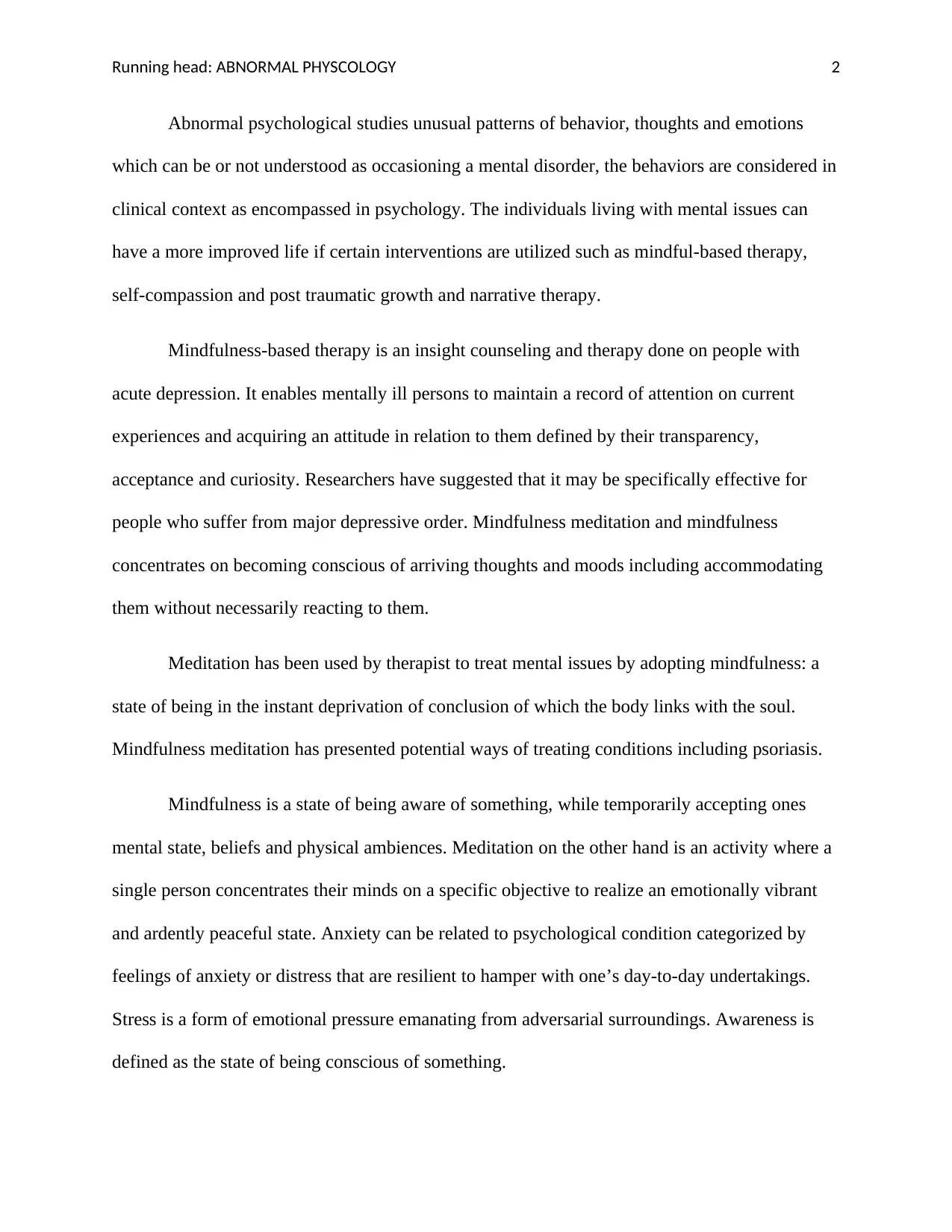
Running head: ABNORMAL PHYSCOLOGY 2
Abnormal psychological studies unusual patterns of behavior, thoughts and emotions
which can be or not understood as occasioning a mental disorder, the behaviors are considered in
clinical context as encompassed in psychology. The individuals living with mental issues can
have a more improved life if certain interventions are utilized such as mindful-based therapy,
self-compassion and post traumatic growth and narrative therapy.
Mindfulness-based therapy is an insight counseling and therapy done on people with
acute depression. It enables mentally ill persons to maintain a record of attention on current
experiences and acquiring an attitude in relation to them defined by their transparency,
acceptance and curiosity. Researchers have suggested that it may be specifically effective for
people who suffer from major depressive order. Mindfulness meditation and mindfulness
concentrates on becoming conscious of arriving thoughts and moods including accommodating
them without necessarily reacting to them.
Meditation has been used by therapist to treat mental issues by adopting mindfulness: a
state of being in the instant deprivation of conclusion of which the body links with the soul.
Mindfulness meditation has presented potential ways of treating conditions including psoriasis.
Mindfulness is a state of being aware of something, while temporarily accepting ones
mental state, beliefs and physical ambiences. Meditation on the other hand is an activity where a
single person concentrates their minds on a specific objective to realize an emotionally vibrant
and ardently peaceful state. Anxiety can be related to psychological condition categorized by
feelings of anxiety or distress that are resilient to hamper with one’s day-to-day undertakings.
Stress is a form of emotional pressure emanating from adversarial surroundings. Awareness is
defined as the state of being conscious of something.
Abnormal psychological studies unusual patterns of behavior, thoughts and emotions
which can be or not understood as occasioning a mental disorder, the behaviors are considered in
clinical context as encompassed in psychology. The individuals living with mental issues can
have a more improved life if certain interventions are utilized such as mindful-based therapy,
self-compassion and post traumatic growth and narrative therapy.
Mindfulness-based therapy is an insight counseling and therapy done on people with
acute depression. It enables mentally ill persons to maintain a record of attention on current
experiences and acquiring an attitude in relation to them defined by their transparency,
acceptance and curiosity. Researchers have suggested that it may be specifically effective for
people who suffer from major depressive order. Mindfulness meditation and mindfulness
concentrates on becoming conscious of arriving thoughts and moods including accommodating
them without necessarily reacting to them.
Meditation has been used by therapist to treat mental issues by adopting mindfulness: a
state of being in the instant deprivation of conclusion of which the body links with the soul.
Mindfulness meditation has presented potential ways of treating conditions including psoriasis.
Mindfulness is a state of being aware of something, while temporarily accepting ones
mental state, beliefs and physical ambiences. Meditation on the other hand is an activity where a
single person concentrates their minds on a specific objective to realize an emotionally vibrant
and ardently peaceful state. Anxiety can be related to psychological condition categorized by
feelings of anxiety or distress that are resilient to hamper with one’s day-to-day undertakings.
Stress is a form of emotional pressure emanating from adversarial surroundings. Awareness is
defined as the state of being conscious of something.
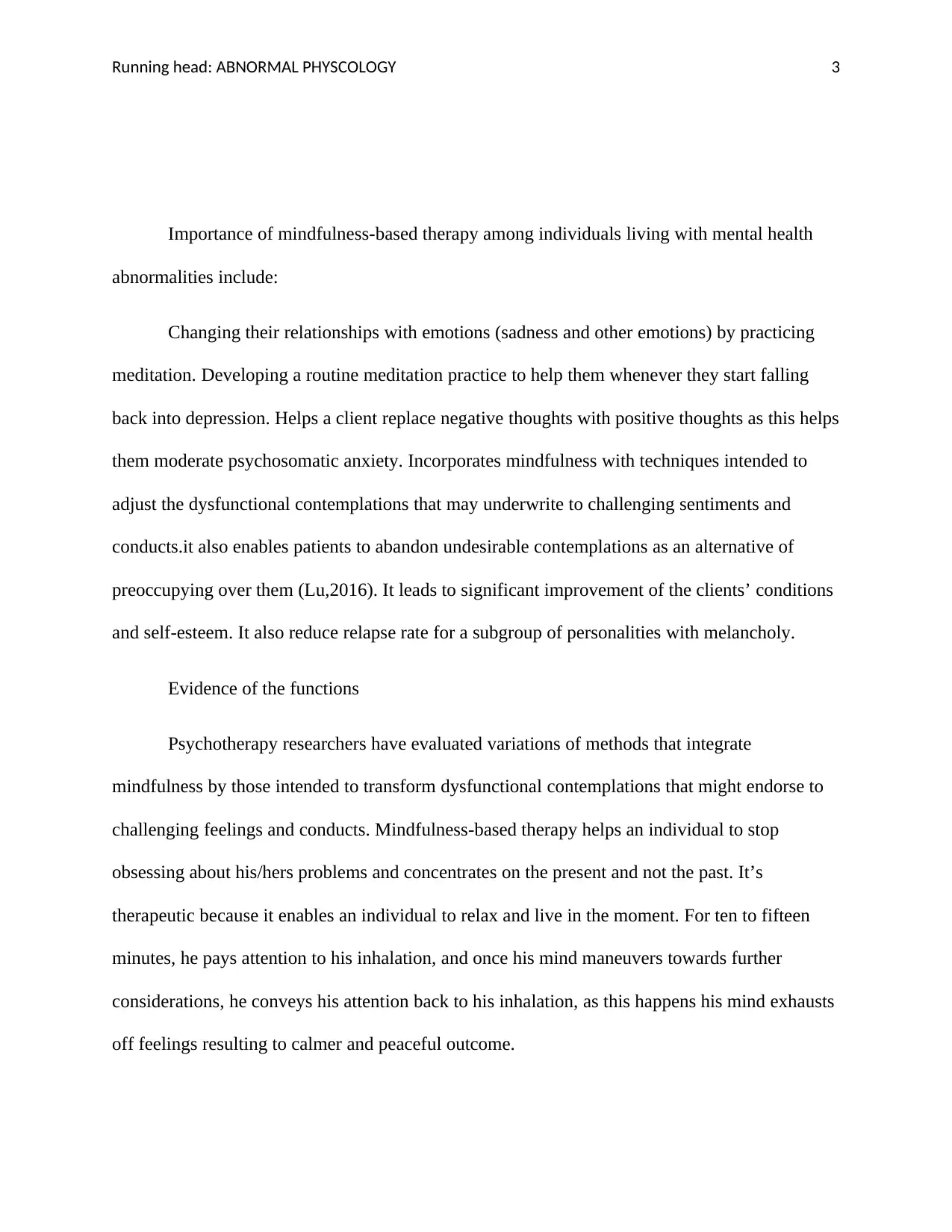
Running head: ABNORMAL PHYSCOLOGY 3
Importance of mindfulness-based therapy among individuals living with mental health
abnormalities include:
Changing their relationships with emotions (sadness and other emotions) by practicing
meditation. Developing a routine meditation practice to help them whenever they start falling
back into depression. Helps a client replace negative thoughts with positive thoughts as this helps
them moderate psychosomatic anxiety. Incorporates mindfulness with techniques intended to
adjust the dysfunctional contemplations that may underwrite to challenging sentiments and
conducts.it also enables patients to abandon undesirable contemplations as an alternative of
preoccupying over them (Lu,2016). It leads to significant improvement of the clients’ conditions
and self-esteem. It also reduce relapse rate for a subgroup of personalities with melancholy.
Evidence of the functions
Psychotherapy researchers have evaluated variations of methods that integrate
mindfulness by those intended to transform dysfunctional contemplations that might endorse to
challenging feelings and conducts. Mindfulness-based therapy helps an individual to stop
obsessing about his/hers problems and concentrates on the present and not the past. It’s
therapeutic because it enables an individual to relax and live in the moment. For ten to fifteen
minutes, he pays attention to his inhalation, and once his mind maneuvers towards further
considerations, he conveys his attention back to his inhalation, as this happens his mind exhausts
off feelings resulting to calmer and peaceful outcome.
Importance of mindfulness-based therapy among individuals living with mental health
abnormalities include:
Changing their relationships with emotions (sadness and other emotions) by practicing
meditation. Developing a routine meditation practice to help them whenever they start falling
back into depression. Helps a client replace negative thoughts with positive thoughts as this helps
them moderate psychosomatic anxiety. Incorporates mindfulness with techniques intended to
adjust the dysfunctional contemplations that may underwrite to challenging sentiments and
conducts.it also enables patients to abandon undesirable contemplations as an alternative of
preoccupying over them (Lu,2016). It leads to significant improvement of the clients’ conditions
and self-esteem. It also reduce relapse rate for a subgroup of personalities with melancholy.
Evidence of the functions
Psychotherapy researchers have evaluated variations of methods that integrate
mindfulness by those intended to transform dysfunctional contemplations that might endorse to
challenging feelings and conducts. Mindfulness-based therapy helps an individual to stop
obsessing about his/hers problems and concentrates on the present and not the past. It’s
therapeutic because it enables an individual to relax and live in the moment. For ten to fifteen
minutes, he pays attention to his inhalation, and once his mind maneuvers towards further
considerations, he conveys his attention back to his inhalation, as this happens his mind exhausts
off feelings resulting to calmer and peaceful outcome.
⊘ This is a preview!⊘
Do you want full access?
Subscribe today to unlock all pages.

Trusted by 1+ million students worldwide
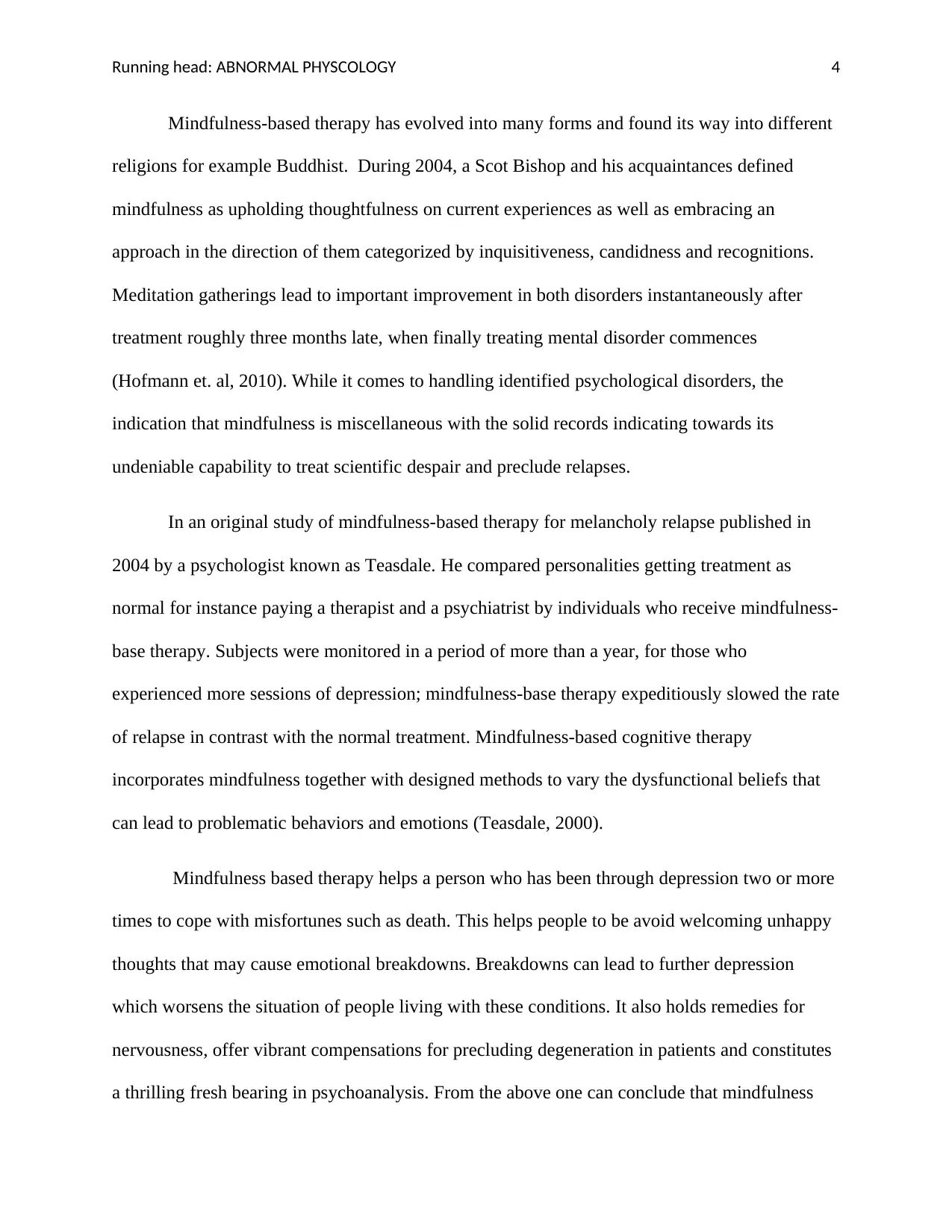
Running head: ABNORMAL PHYSCOLOGY 4
Mindfulness-based therapy has evolved into many forms and found its way into different
religions for example Buddhist. During 2004, a Scot Bishop and his acquaintances defined
mindfulness as upholding thoughtfulness on current experiences as well as embracing an
approach in the direction of them categorized by inquisitiveness, candidness and recognitions.
Meditation gatherings lead to important improvement in both disorders instantaneously after
treatment roughly three months late, when finally treating mental disorder commences
(Hofmann et. al, 2010). While it comes to handling identified psychological disorders, the
indication that mindfulness is miscellaneous with the solid records indicating towards its
undeniable capability to treat scientific despair and preclude relapses.
In an original study of mindfulness-based therapy for melancholy relapse published in
2004 by a psychologist known as Teasdale. He compared personalities getting treatment as
normal for instance paying a therapist and a psychiatrist by individuals who receive mindfulness-
base therapy. Subjects were monitored in a period of more than a year, for those who
experienced more sessions of depression; mindfulness-base therapy expeditiously slowed the rate
of relapse in contrast with the normal treatment. Mindfulness-based cognitive therapy
incorporates mindfulness together with designed methods to vary the dysfunctional beliefs that
can lead to problematic behaviors and emotions (Teasdale, 2000).
Mindfulness based therapy helps a person who has been through depression two or more
times to cope with misfortunes such as death. This helps people to be avoid welcoming unhappy
thoughts that may cause emotional breakdowns. Breakdowns can lead to further depression
which worsens the situation of people living with these conditions. It also holds remedies for
nervousness, offer vibrant compensations for precluding degeneration in patients and constitutes
a thrilling fresh bearing in psychoanalysis. From the above one can conclude that mindfulness
Mindfulness-based therapy has evolved into many forms and found its way into different
religions for example Buddhist. During 2004, a Scot Bishop and his acquaintances defined
mindfulness as upholding thoughtfulness on current experiences as well as embracing an
approach in the direction of them categorized by inquisitiveness, candidness and recognitions.
Meditation gatherings lead to important improvement in both disorders instantaneously after
treatment roughly three months late, when finally treating mental disorder commences
(Hofmann et. al, 2010). While it comes to handling identified psychological disorders, the
indication that mindfulness is miscellaneous with the solid records indicating towards its
undeniable capability to treat scientific despair and preclude relapses.
In an original study of mindfulness-based therapy for melancholy relapse published in
2004 by a psychologist known as Teasdale. He compared personalities getting treatment as
normal for instance paying a therapist and a psychiatrist by individuals who receive mindfulness-
base therapy. Subjects were monitored in a period of more than a year, for those who
experienced more sessions of depression; mindfulness-base therapy expeditiously slowed the rate
of relapse in contrast with the normal treatment. Mindfulness-based cognitive therapy
incorporates mindfulness together with designed methods to vary the dysfunctional beliefs that
can lead to problematic behaviors and emotions (Teasdale, 2000).
Mindfulness based therapy helps a person who has been through depression two or more
times to cope with misfortunes such as death. This helps people to be avoid welcoming unhappy
thoughts that may cause emotional breakdowns. Breakdowns can lead to further depression
which worsens the situation of people living with these conditions. It also holds remedies for
nervousness, offer vibrant compensations for precluding degeneration in patients and constitutes
a thrilling fresh bearing in psychoanalysis. From the above one can conclude that mindfulness
Paraphrase This Document
Need a fresh take? Get an instant paraphrase of this document with our AI Paraphraser
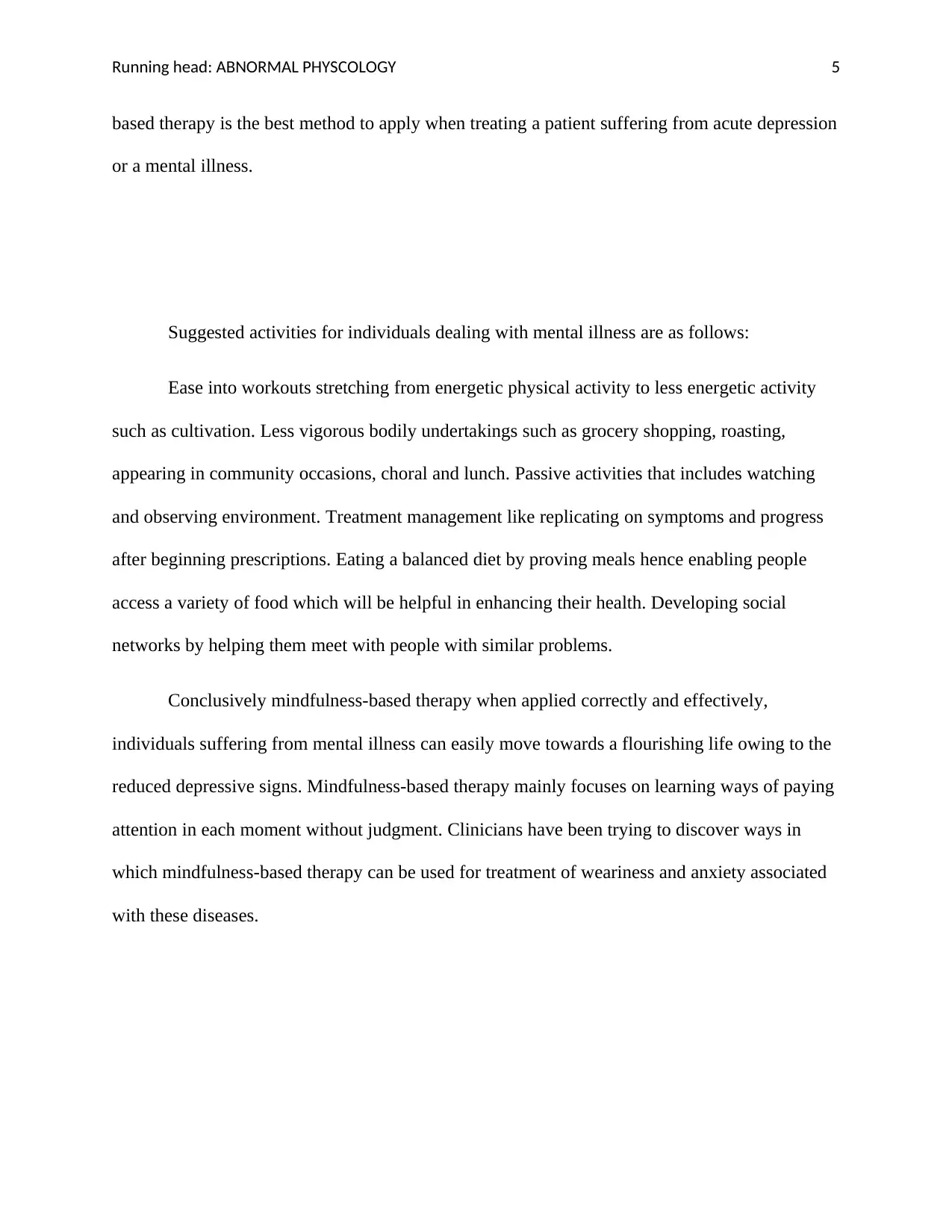
Running head: ABNORMAL PHYSCOLOGY 5
based therapy is the best method to apply when treating a patient suffering from acute depression
or a mental illness.
Suggested activities for individuals dealing with mental illness are as follows:
Ease into workouts stretching from energetic physical activity to less energetic activity
such as cultivation. Less vigorous bodily undertakings such as grocery shopping, roasting,
appearing in community occasions, choral and lunch. Passive activities that includes watching
and observing environment. Treatment management like replicating on symptoms and progress
after beginning prescriptions. Eating a balanced diet by proving meals hence enabling people
access a variety of food which will be helpful in enhancing their health. Developing social
networks by helping them meet with people with similar problems.
Conclusively mindfulness-based therapy when applied correctly and effectively,
individuals suffering from mental illness can easily move towards a flourishing life owing to the
reduced depressive signs. Mindfulness-based therapy mainly focuses on learning ways of paying
attention in each moment without judgment. Clinicians have been trying to discover ways in
which mindfulness-based therapy can be used for treatment of weariness and anxiety associated
with these diseases.
based therapy is the best method to apply when treating a patient suffering from acute depression
or a mental illness.
Suggested activities for individuals dealing with mental illness are as follows:
Ease into workouts stretching from energetic physical activity to less energetic activity
such as cultivation. Less vigorous bodily undertakings such as grocery shopping, roasting,
appearing in community occasions, choral and lunch. Passive activities that includes watching
and observing environment. Treatment management like replicating on symptoms and progress
after beginning prescriptions. Eating a balanced diet by proving meals hence enabling people
access a variety of food which will be helpful in enhancing their health. Developing social
networks by helping them meet with people with similar problems.
Conclusively mindfulness-based therapy when applied correctly and effectively,
individuals suffering from mental illness can easily move towards a flourishing life owing to the
reduced depressive signs. Mindfulness-based therapy mainly focuses on learning ways of paying
attention in each moment without judgment. Clinicians have been trying to discover ways in
which mindfulness-based therapy can be used for treatment of weariness and anxiety associated
with these diseases.
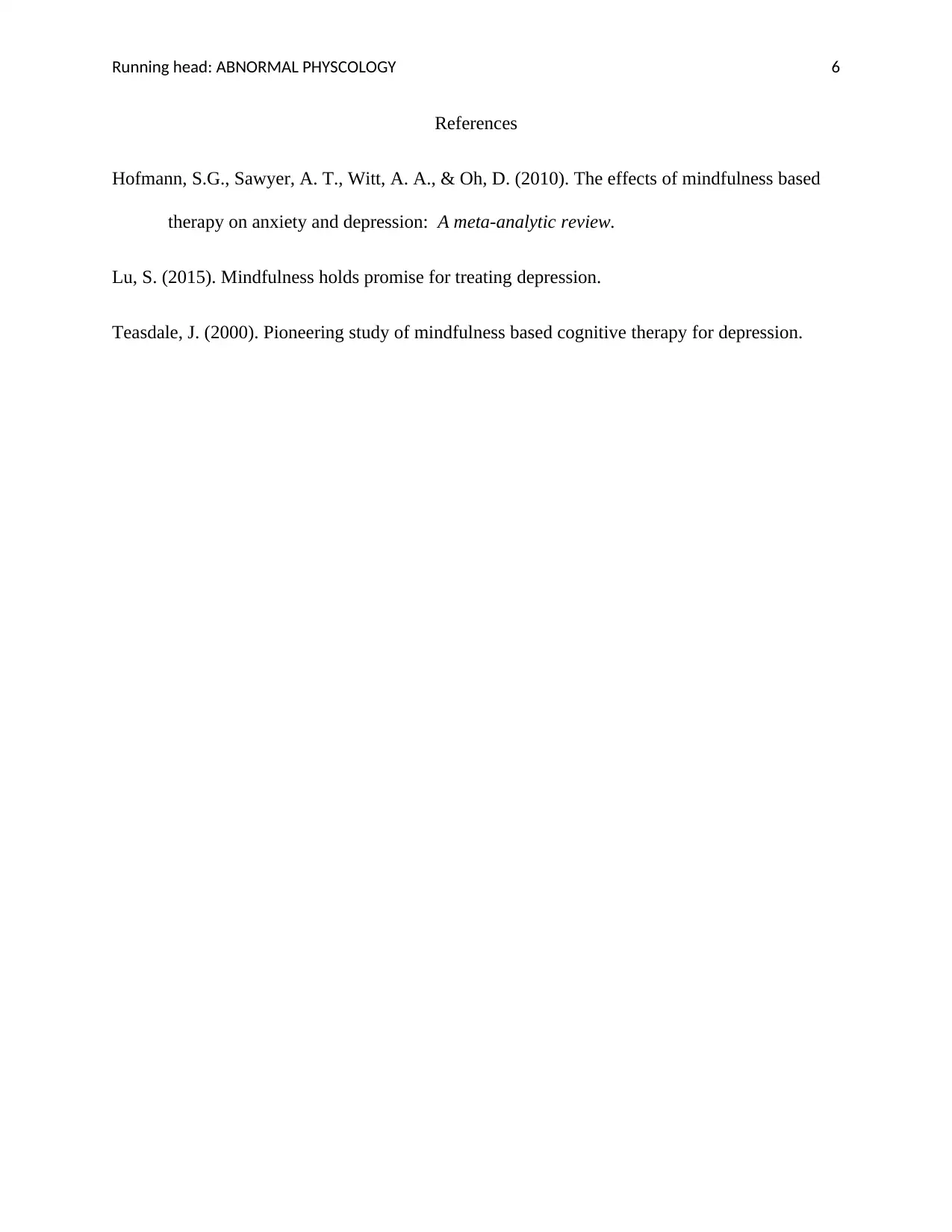
Running head: ABNORMAL PHYSCOLOGY 6
References
Hofmann, S.G., Sawyer, A. T., Witt, A. A., & Oh, D. (2010). The effects of mindfulness based
therapy on anxiety and depression: A meta-analytic review.
Lu, S. (2015). Mindfulness holds promise for treating depression.
Teasdale, J. (2000). Pioneering study of mindfulness based cognitive therapy for depression.
References
Hofmann, S.G., Sawyer, A. T., Witt, A. A., & Oh, D. (2010). The effects of mindfulness based
therapy on anxiety and depression: A meta-analytic review.
Lu, S. (2015). Mindfulness holds promise for treating depression.
Teasdale, J. (2000). Pioneering study of mindfulness based cognitive therapy for depression.
⊘ This is a preview!⊘
Do you want full access?
Subscribe today to unlock all pages.

Trusted by 1+ million students worldwide
1 out of 6
Related Documents
Your All-in-One AI-Powered Toolkit for Academic Success.
+13062052269
info@desklib.com
Available 24*7 on WhatsApp / Email
![[object Object]](/_next/static/media/star-bottom.7253800d.svg)
Unlock your academic potential
Copyright © 2020–2026 A2Z Services. All Rights Reserved. Developed and managed by ZUCOL.




